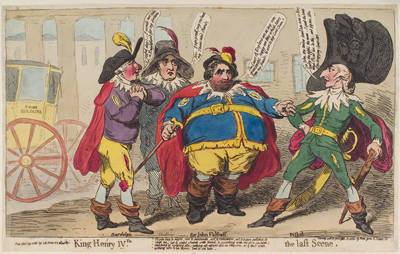King Henry IVth, the Last Scene
In the final scenes of Henry IV, Part 2, Falstaff learns from Pistol of the death of King Henry IV and the ascension to the throne of Prince Hal, the former Prince of Wales. Expecting significant promotions from their erstwhile tavern mate, Falstaff, Bardolph, and Pistol return from Gloucestershire where Sir John had been taking advantage of the country bumpkin, Shallow, and speed back to London to greet the new King.
In the fall of 1788, King George III was stricken by a variety of symptoms both physical and mental, that baffled his doctors, left him in frequent pain, babbling incoherently, and made those closest to him fear for his life and sanity. Indeed in early November some London newspapers had confidently but mistakenly reported the King's death.
As fate would have it, Charles James Fox, the person who had the most to gain from the King's death or permanent insanity was out of the country vacationing in Italy with his mistress, Mrs. Armistead. When he heard the news of the King's deteriorating condition, he "hurried home. . .in a furious six-day gallop across Italy and France,"* half expecting that his old drinking and gambling buddy, the Prince of Wales, might already have been declared George IV by the time he arrived on November 25th, four days before this print appeared.

© National Portrait Gallery, London
To Gillray, a lover of theater, and especially Shakespeare, the parallels in situation (not to mention size and character) between Falstaff and Fox must have seemed almost too easy. The print shows the Falstaffian Fox in front the Prince's residence, Carlton House, having just arrived from Bologna (as the coach indicates) ":stained with travel and sweating with desire to see him. " according to the subtitle from Act V Scene v. Most of the other speech bubbles come from Act V, Scene iii. Pistol/George Hanger (a close companion of the Prince of Wales) announces the King's demise. Bardolph/Sheridan (another friend of both the Prince and Fox) celebrates his potential good fortune. The simple country man, Shallow/Duke of Bedford wishes only to recover the money he has spent on the support of Fox and his causes.
But Gillray was most prescient in portraying Fox as Falstaff, for Fox clearly trusted that the change of monarch would put him in charge of a new ministry where, in effect, the laws of England would be at his commandment. And it was, in fact, Fox's over-eagerness for that change of monarch in a subsequent speech in Parliament that exposed a Falstaffian willingness to cast aside all scruples in a selfish quest for power and position.
* John W. Derry, Charles James Fox, p. 263.
Sources and Reading
- Commentary from the British Museum on King Henry IVth: the Last Scene
- "George III of the United Kingdom," Wikipedia
- "Charles James Fox," Wikipedia
- "Richard Brinsley Sheridan," Wikipedia
- "George Hanger, 4th Baron Coleraine," Wikipedia
- King Henry IV, Part 2, (Full Text)
Comments & Corrections
NOTE: Comments and/or corrections are always appreciated. To make that easier, I have included a form below that you can use. I promise never to share any of the info provided without your express permission.